Bill Nye the Unscientific Abortion Guy
by Trent Horn
Filed under Morality, Science
This past weekend former-educational-TV-star-turned-science-advocate Bill Nye posted a video about abortion on Big Think. Nye attempts to use science to resolve the debate about abortion and arrives at the following conclusion: “When it comes to women’s rights with respect to their reproduction, I think you should leave it to women.” The video is a perfect example of Maslow’s Hammer, or the saying, “If all you have is a hammer, everything looks like a nail.” In this case, the... Read More
Does Religion Really Have a “Smart-People Problem”?
by Bishop Robert Barron
Filed under New Atheists, Religion
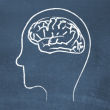
Daniel Dennett, one of the “four horsemen” of contemporary atheism, proposed in 2003 that those who espouse a naturalist, atheist worldview should call themselves “the brights,” thereby distinguishing themselves rather clearly from the dim benighted masses who hold on to supernaturalist convictions. In the wake of Dennett’s suggestion, many atheists have brought forward what they take to be ample evidence that the smartest people in our society do indeed subscribe to anti-theist... Read More
Prayer, Science, and the Existence of God
by Trent Horn
Filed under Belief, Science, The Existence of God
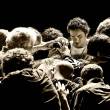
Can science find God? If God is defined as a being (or perhaps “the ground of being”) that is neither composed of matter nor confined to a spatial location, then the answer seems to be no. After all, science is limited to explaining the natural, physical world. If God exists beyond that world and is not composed of anything found within it, then he seems to be out of the reach of scientific inquiry. But even if science can’t “find” God in the same way I can find my car in a parking... Read More
God, Professors, and Evolutionary Biology Classes
by Dr. Stacy Trasancos
Filed under Christianity and Science, Evolution
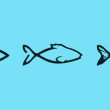
Professor David P. Barash recently wrote an opinion column in the New York Times titled “God, Darwin and My College Biology Class.” Professor Barash is in the psychology department at the University of Washington. He teaches courses on sociobiology. He explained in his essay why he gives undergraduate students “The Talk.” No, it’s not about sex. The Talk is about faith and science. He says: "And that’s where The Talk comes in. It’s irresponsible to teach biology without... Read More
Science or Myth: A False Dichotomy
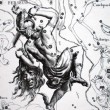
“Reality is everything that exists. That sounds straightforward, doesn’t it? Actually it isn’t.” Thus begins Professor Richard Dawkins’ recent book, The Magic of Reality. In order to explain reality, Professor Dawkins takes us on a tour of modern science by contrasting its explanations with those we find in myths and fables: “These are the stories we all remember with fondness from our childhood, and many of us still enjoy when served up in a traditional Christmas... Read More
Scientific Geniuses and Their Jesuit Collaborators
by Andrew Kassebaum
Filed under Christianity and Science
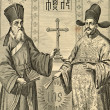
Herbert Butterfield, the influential twentieth-century historian, identified the Scientific Revolution as “one of the great episodes in human history,” which, along with the rise of the empires of Alexander the Great and ancient Rome, deserves a place “amongst the epic adventures that have helped to make the human race what it is.”1 Numerous Catholic scientists, both laymen and churchmen alike, made valuable contributions to science before, during, and after the Scientific Revolution. The... Read More
The Stillbirth of Science in Arabia
by Dr. Stacy Trasancos
Filed under Christianity and Science
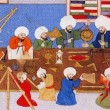
NOTE: Today we wrap up our weekly series of essays by Dr. Stacy Trasancos on the "stillbirths" of science. They're based on Fr. Stanley L. Jaki's research into the theological history of science in the ancient cultures of Egypt, China, India, Babylon, Greece, and Arabia. See past articles here. The last culture to be examined is that of the Muslims. Although theirs was a monotheistic view, it was not a Christological or Trinitarian view, which left it vulnerable to a monotheism... Read More
The Stillbirth of Science in China
by Dr. Stacy Trasancos
Filed under Christianity and Science
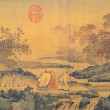
NOTE: Today we're continuing our weekly series of essays by Dr. Stacy Trasancos on the "stillbirths" of science. They're based on Fr. Stanley L. Jaki's research into the theological history of science in the ancient cultures of Egypt, China, India, Babylon, Greece, and Arabia. See past articles here. There is so much written about China’s rich and illustrious past that no case could ever be made—from the Shang Dynasty (1523–1028 B.C.) to the Ch’ing Dynasty (A.D. 1644–1912)—that... Read More
How Catholic Missionaries Brought Science to China
by Andrew Kassebaum
Filed under Christianity and Science
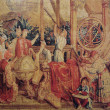
In late December 1668, in a contest held at the Chinese Bureau of Astronomy, the Jesuit Ferdinand Verbiest (1623-1688) correctly predicted the length of a shadow cast by a vertical rod. The Kangxi Emperor was impressed. But he challenged Verbiest to two additional tests: the prediction of the exact position of the sun and planets on a given day and the timing of an approaching lunar eclipse. Verbiest successfully completed the final two tests, and, in the process, showed that the Chinese... Read More
Molecules and Mourning

Materialism has always had a difficult time dealing with death, because it has to claim that death is not a big deal. If there is nothing more to life than the matter of the body, once the body dies there is nothing left to “experience” death. The ancient atomists were explicit in this claim, with Epicurus stating: "Death, therefore, the most awful of evils, is nothing to us, seeing that, when we are, death is not come, and, when death is come, we are not." While it is debatable how... Read More






